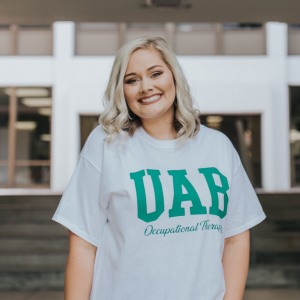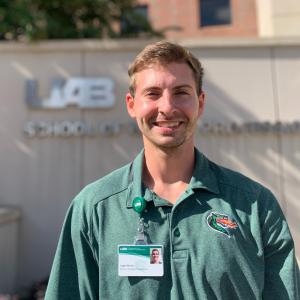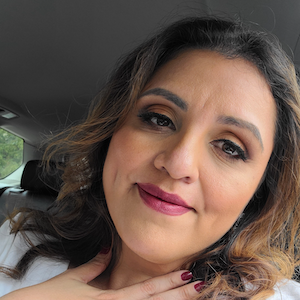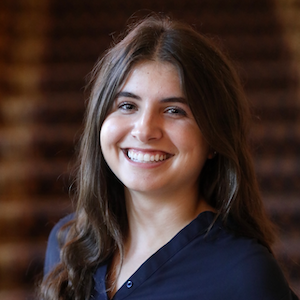Each year during Homecoming Week, five students in the School of Health Professions are awarded a Blazer Forever Scholarship. Students are selected based on their essay answers. This year, we asked "what makes you different?" Read below for their answers.
Anna Grace Feltham, Occupational Therapy
 In all reality, I should be a statistic. I should not have graduated from high school, I should not have graduated from a four-year college, and I should not be obtaining my master’s degree. I should be a statistic. But I am not…and that is what makes me different. I come from a long line of addiction, mental health issues, teen pregnancies, and poverty. Statistically, I should be on drugs, on multiple medications for my mental health, applying for WIC, or applying for food stamps. But because I chose the road less traveled in my family, I am different.
In all reality, I should be a statistic. I should not have graduated from high school, I should not have graduated from a four-year college, and I should not be obtaining my master’s degree. I should be a statistic. But I am not…and that is what makes me different. I come from a long line of addiction, mental health issues, teen pregnancies, and poverty. Statistically, I should be on drugs, on multiple medications for my mental health, applying for WIC, or applying for food stamps. But because I chose the road less traveled in my family, I am different.
Growing up, I never felt like I belonged in my family. I always felt “different,” more mature, and “better.” Maybe this was me being selfish, or maybe this was the universe’s way of helping a small-town girl break the mold…Either way, I took the attitude I was given and ran with it. Of course, there have been challenges along the way, but I am who I am today because I refused to be a statistic. All this to say, in my future profession, I refuse to let my clients be just another statistic. With all I have been through, I have truly learned, there is always a road less traveled, and in my case, the grass is greener on the other side. I am different because I broke the mold of statistics, one degree at a time, and I plan to continue breaking the mold for years to come.
Logan Myrick, Physical Therapy
 “What makes you stand out in your program?” This question has endless answers and stories that vary between individuals. Some may say it is their genetics, others will explain they are different because of their experiences, and some would even say their attitude orchestrates their ability to stand out. When I see this question, although the cumulation of many factors makes me stand out, what makes me stand out the most are my service oriented mindset, my empathetically-driven approach to healthcare, and my ambition to make healthcare more accessible by focusing on social determinants of health.
“What makes you stand out in your program?” This question has endless answers and stories that vary between individuals. Some may say it is their genetics, others will explain they are different because of their experiences, and some would even say their attitude orchestrates their ability to stand out. When I see this question, although the cumulation of many factors makes me stand out, what makes me stand out the most are my service oriented mindset, my empathetically-driven approach to healthcare, and my ambition to make healthcare more accessible by focusing on social determinants of health.
Healthcare professionals are obligated to promote healthcare everywhere they are. Healthcare does not stop at the door to a clinic, hospital, office, or gym. Healthcare extends into the community through service projects and volunteerism to ensure that mental and social health are accomplished in conjunction with physical health. As a member of the UAB DPT Community Service Committee, I have witnessed first-hand that being active in community efforts has a direct effect on the health of community members and am passionate that all healthcare providers should be involved in their communities. Community service improves social, mental, and physical health of community members and creates unity amongst the members that allows them to confide in one another to create a powerful cycle of improving health.
Many practicing clinicians say, “Empathy drives practice”. This means healthcare professionals should always come from a place of understanding, open-mindedness, and patient-centered healthcare approaches. This mentality allows me to connect with patients on a more personal level, as well as understand that I may not always understand what they are going through. In those situations, open-mindedness is key to connection and communication. I am eager to learn how I can be a better clinician from the patient. This approach to healthcare is a strength that allows me to connect with patients, work colleagues, classmates, and the community to improve healthcare practice monumentally.
Lastly, I strive to focus on social determinants of health to make healthcare more accessible for individuals. I am aspiring to become a travel therapist so I can make differences in a vast number of communities. In each community, I would like to make changes in the clinic that allow them to be more accessible to patients that are facing social determinant barriers, such as public transportation, cost of healthcare, and making at-home treatment sessions more accessible. Social determinants of health are all too often overshadowed in the healthcare field when looking at proper patient care, but are vital to understand the patients and their prognoses.
In conclusion, these aspects that help define who I am and help me stand out among my peers culminate with one another to generate a melting pot of potential where the only limit is my imagination. I thoroughly believe with service-based minds, empathy-driven care, and social determinant changes, healthcare can be progressed immensely. I plan to continue to implement these features into healthcare, which is why I stand out.
Anita Samaniego-Avellana, Healthcare Simulation
 The biggest difference would be that I am not supposed to be here. What does the mean? First it starts with being a daughter from an immigrant father who does not speak English. It also comes from mutigenerational women who did not even finish high school and all became mothers before the age of 16. My roots come from generations of women being wife's mothers and care takers. What changed? My maternal grandmother instilled in me that in order to be and independent woman I would need to have an education. I worked two jobs in high school; I also worked two jobs while getting my LVN. Once I became an LVN I worked two jobs to get my RN. I worked two jobs so I would have no financial debt while going through school. All of this made me a stronger person. As an RN I worked for less money so that I could gain the knowledge that would help further my career. I bring 21+ years of nursing at the bedside from HomeHealth care to level 1 trauma care. My whole career has been worse case scenario. I feel this level of experience helps when it comes to teaching others. I also feel this level of experience will help when developing SIM scenarios.
The biggest difference would be that I am not supposed to be here. What does the mean? First it starts with being a daughter from an immigrant father who does not speak English. It also comes from mutigenerational women who did not even finish high school and all became mothers before the age of 16. My roots come from generations of women being wife's mothers and care takers. What changed? My maternal grandmother instilled in me that in order to be and independent woman I would need to have an education. I worked two jobs in high school; I also worked two jobs while getting my LVN. Once I became an LVN I worked two jobs to get my RN. I worked two jobs so I would have no financial debt while going through school. All of this made me a stronger person. As an RN I worked for less money so that I could gain the knowledge that would help further my career. I bring 21+ years of nursing at the bedside from HomeHealth care to level 1 trauma care. My whole career has been worse case scenario. I feel this level of experience helps when it comes to teaching others. I also feel this level of experience will help when developing SIM scenarios.
I do love to teach others at the bedside but never had the desire to teach in an academic sense. I feel that my greatest strength is my ability to relate to patients and comfort them when they most need it. I had a brief stent of working with a SIMS department when I finished my BSN at the University of the Incarnate Word. I found that SIMS let me teach at a bedside using my experience and not just reading back a book in a didactic sense. SIM lets me use past experiences to teach; When you lecture about past experience it is not the same experience for your student. I hope that my fellow classmate will be able to draw from my past experiences when studying Health Care Simulation and be able to pass those on to others.
Corrina Kalogeropulou, Nutrition Sciences
 During my undergraduate degree, I studied financial mathematics and statistics. I am now in the LMDP program at UAB. During my senior year of undergrad, I realized my passion for nutrition but thought it was too late to switch. After realizing that it is never too late to switch career paths, I decided to push through and make the change in January 2020 and started taking science prerequisite courses to apply for this master's program. I have persevered throughout the past few years, even though having experienced panic disorder and adenomyosis since 2017. Panic disorder is a type of anxiety disorder where individuals experience recurrent panic attacks that are unexpected and unpredictable. Through therapy and books, I have found many strategies to cope with panic disorder. One of my favorite coping methods is alternate nostril breathing. I find that this helps soothe the panic within a couple of minutes. It has been hard to deal with panic disorder, but I have learned so much about myself and allowed myself to explore my inner thoughts and feelings.
During my undergraduate degree, I studied financial mathematics and statistics. I am now in the LMDP program at UAB. During my senior year of undergrad, I realized my passion for nutrition but thought it was too late to switch. After realizing that it is never too late to switch career paths, I decided to push through and make the change in January 2020 and started taking science prerequisite courses to apply for this master's program. I have persevered throughout the past few years, even though having experienced panic disorder and adenomyosis since 2017. Panic disorder is a type of anxiety disorder where individuals experience recurrent panic attacks that are unexpected and unpredictable. Through therapy and books, I have found many strategies to cope with panic disorder. One of my favorite coping methods is alternate nostril breathing. I find that this helps soothe the panic within a couple of minutes. It has been hard to deal with panic disorder, but I have learned so much about myself and allowed myself to explore my inner thoughts and feelings.
Adenomyosis is a condition where the tissue that normally lines the uterus grows into the muscular wall of the uterus, causing terrible cramps and heavy periods. With adenomyosis, I sometimes lose a couple of days due to debilitating cramps. I have found some remedies to this by eating nutrient-dense foods high in omega-3 fatty acids, avoiding sugar and processed foods, and maintaining a consistent exercise regimen. Life has its challenges, but I believe that these experiences have made me a stronger person overall. Going through this has made me feel so grateful for the present moment and my day-to-day life. My dream as a future dietitian is to utilize everything I have learned in the past four years and guide people to healing and becoming their best selves. With my gentleness and welcoming attitude, I will build strong relationships with people and assist them in changing their diet and habits to prevent or minimize illness. I would love to empower people and help them find their strength within themselves to change because I know everyone has that power, as I saw it in myself. By earning this degree, I hope to support many individuals and communities to reach their health goals and feel at peace within their bodies. Finally, I would love to assist communities impacted by food deserts and find a way to make healthy foods accessible to people of all walks of life. An idea could be providing community gardens or education programs that give people the ability and knowledge to choose healthier food options. I am so excited to be in this program, and I can't wait to see what I accomplish in the years to come!
William Doody, Biotechnology
A wise man once said to me, "that one's life can only truly be judged by how far they went to make the lives of those whose best day was your worst day better." As a young adult, on the cusp of turning 22 at the time, I thought that was the stupidest thing I had ever heard as someone who had spent the last four years coming to terms with having an eating disorder, spending many nights in my car as I slept at various "friend's" houses, and trying to balance a rocky relationship with my family as they struggled with my sister's bipolar disorder and me coming out as gay. I believed that anyone who had it worse than me must have already blown their brains out by now, and if they had not, then it had to be because they were too poor to afford a gun or too stupid to use it.
While I would love to say that after a few months of turning 22, my life dramatically changed and that I got everything back on track, sadly, that would be a lie. It got worse. I feel out of touch with my family, ended for a while being "friends" with an in-and-out heroin addict, intense alcoholics, and some people who used me as an emotional punching bag so I could have a couch to sleep on rather than in my car.
Thankfully, when I turned 23, I had built and maintained good enough credit to get an apartment. I cried every night for the first three months because I was so afraid I would miss a payment and go back to living in my car or worse. I had no furniture, but I did have some amazing friends from my major, political science, and those I met along the way but never bothered because I was afraid I would burden them, who once they knew about my issue, got my bedsheets, towels, and furniture.
I took that kindness shown by my friends, and I applied for a student leader position at UAH's Office of Diversity, Equity, and Inclusion (ODEI) to make sure that students who faced homelessness, housing instability, non-traditional, student's with physical and mental disability, and international students have their voice not only strength but have a presence at the table. While my time at UAH came to a close during May 2021, my passion and drive to help others has not.
A wise man also once told me a few months back, "you are only at the beginning of everything." I am ready to take on the challenges that the future holds for me, and I am more than prepared to uplift those around me so that they do not fall and break as I did.

